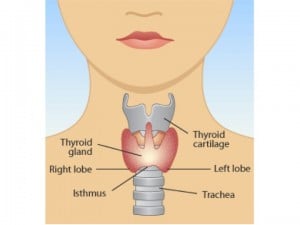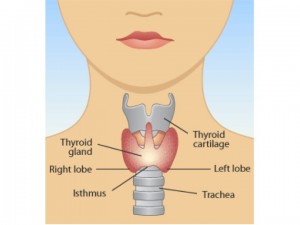We are experiencing a very high volume of calls and messages and ask for your patience. We will answer your portal messages within 48 hours.
We are experiencing a very high volume of calls and messages and ask for your patience. We will answer your portal messages within 48 hours.

 The thyroid is a butterfly-shaped gland in the base of your neck just below the Adam’s apple. It produces several hormones, all of which play an important role in your body's metabolism-- and your fertility.
The thyroid is a butterfly-shaped gland in the base of your neck just below the Adam’s apple. It produces several hormones, all of which play an important role in your body's metabolism-- and your fertility.
This post covers the top ten ways your thyroid can impact your ability to get and stay pregnant-- particularly hypothyroidism (the most common thyroid disorder).
The most important hormone created by the thyroid gland is thyroxine (T4), which controls the body’s metabolism.If there is too much (hyperthyroidism) or too little T4 (hypothyroidism), the body does not function normally.
According to The Thyroid Foundation of America, there are as many as 8 million women in America with untreated thyroid disorders (about 1% of women). For those of reproductive age, infertility or miscarriage may be the first sign that something is wrong.
3) What are the symptoms of hypothyroidism? The slowed-down metabolism associated with hypothyroidism can manifest as fatigue, dry skin, constipation, heavier periods, weight gain, decrease in appetite, lethargy, depression, cold intolerance, or muscle aches.
A simple blood test to measure thyroid stimulating hormone (TSH) level is used to diagnose hypothyroidism. TSH works like a thermostat; it’s produced by the pituitary gland to regulate thyroid function. An elevated TSH level is used to diagnose hypothyroidism. It indicates that the pituitary gland is attempting to compensate for an underactive thyroid gland.
There’s also a blood test that checks for the presence of anti-thyroid antibodies. High levels of these antibodies are typical of a thyroid disease called Hashimoto’s Thyroiditis, which always results in hypothyroidism. Hashimoto’s Thyroiditis is classified as an autoimmune disease, because the body has essentially turned against itself, forming antibodies that attack the cells in the thyroid and slow down production of thyroid hormone. The gland itself may compensate by becoming enlarged.
Sub-clinical hypothyroidism means that there are no symptoms. The only way of diagnosing this condition is with a blood test (TSH level). With elevated TSH levels, the quality of eggs retrieved is compromised. This results in lower pregnancy rates. It is therefore important that the TSH level be normalized prior to an IVF cycle.
To regulate thyroid levels, we prescribe oral synthetic thyroid tablets (Synthroid, Levoxyl, Levothyroxine). The goal is to treat with the lowest effective dose to maintain the TSH level close to (or just below) 2.5. While establishing the correct dose can be quite easy in some individuals, others will fluctuate up and down before stabilizing.
TSH levels should be checked every 3 months during pregnancy and annually thereafter. During pregnancy, an endocrinologist or an obstetrician that’s familiar with thyroid issues should monitor blood levels closely. Uncorrected hypothyroidism can result in stillbirth. I will often tell patients that taking their thyroid pill is as important (if not more) as taking their vitamins!
The good news is that among the various threats to fertility, thyroid disorders are arguably the easiest to identify and treat.

Entire Website © 2003 - 2020
Karande and Associates d/b/a InVia
Fertility Specialists
